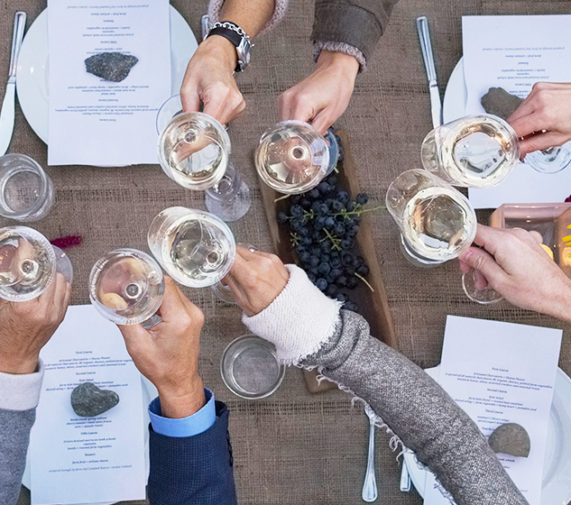If we believe the world of advertising and media, a proper Thanksgiving hinges on gluttony and pressing the “go” button on holiday shopping. But it simply doesn’t have to be that way. Looking at the holiday as a time to focus on gratitude, helping others, and surrounding ourselves with loving friends and family are just a few ways of making the day (and cherished long weekend) one of the best times of the year. You can also enhance the holiday by limiting the waste that comes from preparing huge, lavish feasts, understanding what you’re cooking, where it comes from and its impact on the environment. Here are a few tips, tricks and recipes from the experts.
Amp up the Vegetables
It’s no secret that cutting back on meat consumption is healthier for our bodies and our world. Around 245 million turkeys were raised in 2017, with 45 million making it to a holiday table. Because turkey is a leaner meat, that means it can also turn into one of the driest, if it’s overcooked or under braised. It’s much easier to go turkey-free once you start looking at the bounty of hearty vegetables available to fill the gap. And the opportunities to add healthy twists to an otherwise rich meal are easy, such as mixing rutabaga with potatoes for your mash; the fiber-rich root vegetable is a great source of vitamin C, potassium and calcium among other nutrients (see the recipe below). “Make sure to include plenty of leafy greens on your holiday table,” says Lee Gross, consulting chef for the M Cafe de Chaya in Los Angeles, a pioneering restaurant in the macrobiotic movement. “Dress raw, shredded kale or Brussels sprouts with a tangy, apple-cider vinaigrette and toss with toasted pecans, dried cranberries and grated green apple for a delicious, on-theme antidote to all that rich food,” Gross says. If you do decide to get a bird, look for a sustainably raised, organic (meaning no antibiotics) and even heritage breed turkey.
No Turkey? Try Seafood
Another alternative to not serving meat during the holiday is using sustainable seafood as the main attraction. Oysters make wonderful appetizers or party snacks. A whole roasted salmon — yes, even farm-raised from a reputable source — is just as eye-catching a centerpiece as turkey. Some Whole Foods carry lionfish, whose other name is turkeyfish, a shoo-in for Thanksgiving. If you’re stumped on where to buy sustainable seafood, the Monterey Bay Aquarium Seafood Watch program provides helpful consumer guides for every state, along with reputable outlets to buy seafood and tasty recipes. A great tip: Talk to your purveyor, ask where the fish is from, how it was caught, and how and when it was shipped.
Make It a Zero- or Low-Waste Holiday
Billions of tons of food are wasted each year, and just like recycling or upcycling, limiting food scraps and buying only what you need can greatly reduce waste on an individual level—whether you’re cooking for two or 20. Of course the best way to not waste food is by eating leftovers, which some people look forward to more than the meal itself. But there are myriad ways to cut waste in the kitchen from prep to using food scraps in unique ways. For example, keep fruit and vegetable peels to infuse in vodka for cocktails, save all the turkey bones, plus onion peels, carrot tops and other vegetable odds and ends to make a delicious, healthy broth for soups, sauces or more. The Zero Waste Chef suggests eschewing time-saving ingredients like canned pumpkin, bagged croutons and vinaigrette to cut back on packaging, save money and improve flavor.
Whipped Potato and Rutabaga, courtesy Lee Gross and M Cafe de Chaya
Makes about 5 to 8 servings
1 ½ pounds potatoes (organic Russet will yield best results)
¾ pound rutabaga
⅓ cup unsweetened non-dairy milk, such as oat, rice or soy
¼ pound vegan butter or ¼ cup olive oil
¾ teaspoon sea salt, plus more as needed
¼ teaspoon white pepper
Method:
Wash, trim and peel rutabaga. Cut into 1-inch chunks. Place in pot and cover with cool water by at least 2 inches. Bring to boil over medium heat and add enough sea salt so that you can taste it when stirred into the water. Reduce heat to medium-low and simmer until almost tender, about 20 minutes.
Meanwhile wash and peel potatoes. Cut into 1-inch chunks. When rutabaga is almost tender, add potatoes to the pot, adding additional water if needed to cover potatoes. Return to a boil, then reduce heat to medium-low and simmer until potatoes are just tender, about 20 minutes.
While potatoes are cooking, combine non-dairy milk and vegan butter or olive oil in saucepan and simmer until hot. Keep warm while potatoes finish cooking.
When potatoes and rutabaga are tender, remove from heat and drain well in a colander. If potatoes are excessively wet, you can spread on a sheet pan and bake in a low oven (300°) for 5 to 10 minutes to dry them out. This will help ensure fluffy whipped potatoes!
When potatoes and rutabaga are well-drained and dry, transfer to a bowl and mash well with a potato masher. Mash it as much as you’d like. Some chunks are nice, but for a completely smooth puree you can pass the mixture through a food mill.
Add hot milk and vegan butter to mixing bowl, and stir well to incorporate. Season with additional sea salt and white pepper, to taste, and transfer to a serving dish.
twistup
Love OrangeTwist?
Join our twistup membership and receive a $100 gift card today!




